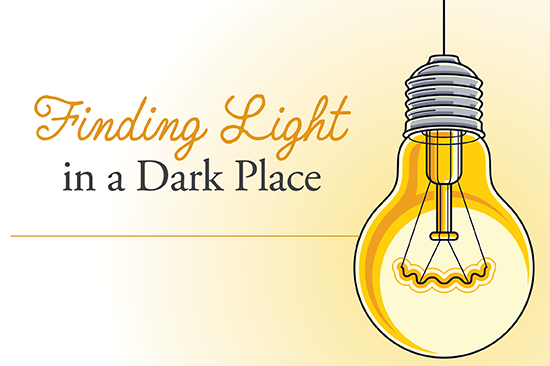
June-July 2020
Heart of the Storm
------------------
|





Finding Light in a Dark Place
By J. Randall Corn
Anyone familiar with the book of Psalms knows you often hear the heart cry of suffering saints within it. It is not unusual to read of the psalmist questioning God and asking that simple and yet profound question: “Why? Why am I suffering?” I was a pastor for 33 years, and during that time, I saw many different types of suffering. I am sure many reading this article today are dealing with hurt of one kind or another. As the wise, old preacher Joseph Parker once advised a group of ministry students: “Preach to broken hearts; there is one on every pew. You will never want for a congregation.”
Psalm 43 gives us a way to find the light when we are in a dark place. To me, the metaphor of darkness captures the mood of what it is like when we suffer. I think this is underlying the wording of verse 3 where the psalmist pleads with God, “Send out thy light and thy truth.” Just what do you do when everything in your life is overshadowed by some problem, a problem that seemingly will not go away?
Before I launch into the psalm, let me assure you I have dealt with—and am currently dealing with—my share of suffering. In November 2014, I began to fall down. I fell about once a month, until I sought consultation with my doctor. He sent me to a neurologist who did a whole battery of tests. Eventually, I was diagnosed with a rare neurological condition called corticobasal degeneration (CBD). You have probably never heard of it, because it is about three times rarer than Lou Gehrig’s disease (ALS). The simplest way to put it is that small areas of my brain are dying, and I will probably lose the ability to walk, talk, and perhaps to reason. No treatment exists. It is a degenerative disease that will steadily get worse over time. The course of the disease ranges six to eight years from onset to death.
This news put me in a very dark place. I began to search for some flicker of light. But, how do you find light in a dark place? In Psalm 43, I find three principles that have helped me, and I am confident can help anyone in the shadowland of suffering.
First, you must talk to God, even when it seems He is not listening. This comes from verses 1 and 2: “Vindicate me, O God, and plead my cause against an ungodly nation; Oh, deliver me from the deceitful and unjust man! For You are the God of my strength; Why do You cast me off? Why do I go mourning because of the oppression of the enemy?”
Note two things here: when you talk to God, get right to the point and be honest about how you feel. The psalmist puts his appeal in the emphatic position by saying first and forcefully, “Vindicate me!” The psalmist wants God to act as his advocate. Eugene Peterson paraphrases this, “Clear my name!” Why? What was the psalmist’s particular problem? Deceitful and unjust men were causing him grief.
Let’s face it, people problems have been with us since Cain and Abel. As Matthew Henry put it, “As long as there are such bad men out of Hell, and nations of them, it is not strange that good men, who are yet out of Heaven, meet with hard and base treatment.”
The psalmist, though, is honest enough to admit it seems God is not listening. This is what verse 2 is all about. He called God his “strength.” The Hebrew could be translated “stronghold,” a reference to the most secure place within a fortified city. Yet, he is “mourning because of the oppression of the enemy.” Again, the Hebrew rendered oppression in this verse is elsewhere “meager rations.” What is meant by this contrast? The psalmist expected more from God.
I am not proposing the “prosperity gospel,” the idea God guarantees His children health, wealth, and happiness. Still, most of us wonder why the Lord doesn’t immediately put an end to our suffering when we ask Him. I’ll be honest enough to say I have wondered that myself. I certainly have prayed for healing, and a friend told me I am probably on more church prayer lists than anyone
in my county!
I fear too many of us have what might be called a “vending machine” concept of God. We have put our “money” (church attendance, Bible reading, prayer, service, and, yes, tithes) into the slot, and God refuses to give us what we have punched into the keypad. When that happens with a real vending machine, I tend to bang on the side of it and mutter under my breath. Are we guilty of doing the same thing with God? Perhaps this is why the psalmist says he feels “cast off” and goes about mourning. Yes, it can seem like God is not listening, but like the writer of this psalm, we must have enough faith to talk to God anyway.

Second, you must follow God, even though you don’t know where He will take you. This is based on verse 3: “O send out thy light and thy truth: let them lead me; let them bring me unto thy holy hill, and to thy tabernacles.” This is a prayer for divine guidance. To quote Peterson’s paraphrase, “Give me your lantern and compass; give me a map so I can find my way to the sacred mountain, to the place of your presence.” We need the Lord to point the way, or better yet, to lead us by the hand. This will eliminate the sense of alienation from God we feel when we suffer. As one of the ancient commentators wrote, “Send your light and overcome my shadows. Send your truth and conquer the lies that surround me!”
What does God’s light and truth look like? It looks like Jesus. He is the Light of the World and the very personification of truth. When we follow His example, study His Word, and allow the Holy Spirit to apply it to our hearts, we will indeed have divine guidance. Beyond this truth is the fact that, as God’s children, we have a responsibility to take God’s light and truth to a dark and confused world. I am confident this is why the founders of Welch College made “O, Send Out Your Light and Your Truth” the school motto. You will find those words inscribed in English, Hebrew, and Latin on Coffman Hall. Let’s make these words more than just an inscription. Let’s make it our mission!
Even though we don’t know where God will take us, the text seems to answer He will take us to His holy hill and to His tabernacle. This is the ultimate destination, but the route God uses to take us there is not stated. The Lord may lead us over some rough terrain to get to where He wants us to be. It takes courage to make the trip.
Finally, you must worship God, even though you don’t feel like it. These truths are found in verses 4 and 5: “Then I will go to the altar of God, To God my exceeding joy; And on the harp I will praise You, O God, my God. Why are you cast down, O my soul? And why are you disquieted within me? Hope in God; For I shall yet praise Him, the help of my countenance and my God.” The psalmist rejoices in God, declaring Him to be his “exceeding joy.” Note he refers to the Lord as “my God,” not simply “God” or “a god,” but rather the God with whom he had a personal relationship—my God.
Still, we must worship, even though we don’t feel like it. The psalmist was quite frank, admitting his soul is “cast down” and “disquieted.” That would be enough to keep most people from worship. I am not sure I know all the reasons for this resistance to worship when suffering. Perhaps it is because we associate only positive, uplifting emotions with worship. Whatever the reason, like the psalmist, we must discipline ourselves and come to the altar.
Talk to God, follow God, worship God—that is the way to find the light in the midst of your darkness. All of us will be broken from time to time, but through this psalm, God reminds us He can and will send light and truth into our lives. With most of us, that means the clouds will part, and light will come back into our lives in the here and now; but for some it won’t. Oh, those will still see the light and glory in the truth, just not in this life.
One of the lies the devil sells and the world buys is that death is always defeat. Don’t you believe it! Death, for the child of God, is the doorway to the moment he or she will be able to speak to God face to face, follow God down the streets of Heaven, and worship Him for all eternity. This is part of what Paul meant when he wrote, “For me to live is Christ, and to die is gain.”
Now, I would prefer some sort of divine intervention, a medical miracle that would extend my life. I am confident God could do that if it were His will. But what if it isn’t? To use a biblical phrase, I have set my house in order. All of us are going to die. I may just have more of a hint about the particulars of my departure more than you, and I am ready to go. Not because of any merit on my part but because of the amazing grace of God. Can you say the same?
About the Writer: J. Randall (Randy) Corn pastored churches in Alabama, Illinois, Georgia, and Tennessee over three decades. Before declining health forced his resignation, he also served as a long-time member of the Commission for Theological Integrity.
|
|

